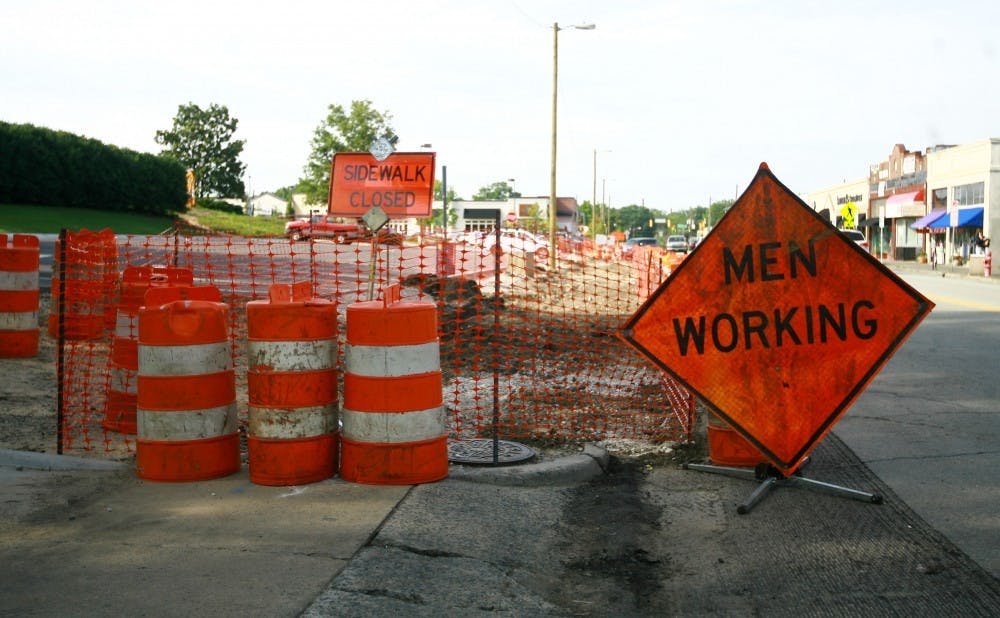Durham’s Ninth Street is encountering changes—and challenges—in the face of recent development on the west side of the street.
Ninth Street has been traditionally known for its eclectic, locally-owned businesses. On the east side of the street reside independent businesses beloved by locals and students alike. The west side of the street, however, is reflective of a very different trend—boasting the new construction of a drive-through bank and the large chain stores like Harris Teeter and Panera Bread.
The rapid influx of new businesses and construction projects have brought in more customers, but also pushed rents higher and led to parking restrictions, which local shop owners worry are bad for business.
Parking woes
Increased traffic has led to new parking fees and regulations, a persisting source of frustration for Ninth Street’s independent vendors. A 46-space lot on the west side adjacent to the Erwin Mill shops now charges $1 per hour for parking, and a two-hour limit has been placed on on-street parking. The new regulations disproportionately affect small businesses on Ninth Street that rely on on-street parking for both their customers and employees, said Francesca’s Dessert Café owner Jalil Belmouloud. He added that his business has suffered since the implementation of the parking restrictions.
“The city is really hurting us,” Belmouloud said. “You’re imposing on people to not stay longer than two hours. If I get a first ticket, I might come back, but if I get a second ticket, I wouldn’t."
There simply are not enough spaces for customers to park due to the limit on on-street parking, said professor of public policy studies Steve Schewel, a Durham City Council member. Additionally, it is not uncommon for businesses to include parking fees as part of their fixed cost, he added.
But another issue is parking for employees, not visitors. The two-hour limit is also particularly concerning for employees who are accustomed to parking on the street, said Dain Phelan, owner of local pub Dain’s Place.
“Most employees drive cars, and most shifts are longer than two hours,” Phelan said.
Schewel noted that employees who park for eight to ten hours on the street significantly limit the number of spaces left for customers.
An agreement between the city and the developer of Ninth Street’s west side necessitates the new parking fee on the 46-space lot, Schewel said. The developer, which owns the property on which the parking lot resides, rents the space to the city for a price, paid in part by taxpayers and in part by the parking revenues.
Paid parking was likely “inevitable,” said Amy Campbell, former director of Durham’s independent business alliance Sustain-A-Bull.
“[You see] somebody going up and down Ninth Street ticketing people,” she said. “Every time there’s a change like that, especially if you’re used to being able to park for free, it takes some time.”
Raising the rent
The new developments on the west side have brought in increasingly large numbers of people since the recession, said Tom Campbell, co-owner of The Regulator Bookshop.
“There’s a place for both [big and small businesses], and I think that they could complement each other,” Tom Campbell said. “But if rents on this side of the street become too high that locally-owned businesses can’t afford them, that’ll be a problem.”
In recent months, a number of small, independent businesses on Ninth Street have closed due to rent hikes—most notably Charlie’s Pub & Grille and Ox and Rabbit Soda and Sundries. Rents of new developments tend to be higher than the norm in order to pay for construction, explained Shelly Green, president and CEO of the Durham Convention and Visitors Bureau. In turn, the rents of other properties in the area—including those occupied by small businesses with more limited capacity to adjust to higher fixed costs—tend to rise as well.
“I certainly understand from a business perspective why some of the landlords are raising their rents,” Green said. “I think the downside of that is we lose some of the really charming places like Charlie’s. We do lose a little, and I call it ‘sense of place.’”
Get The Chronicle straight to your inbox
Signup for our weekly newsletter. Cancel at any time.

